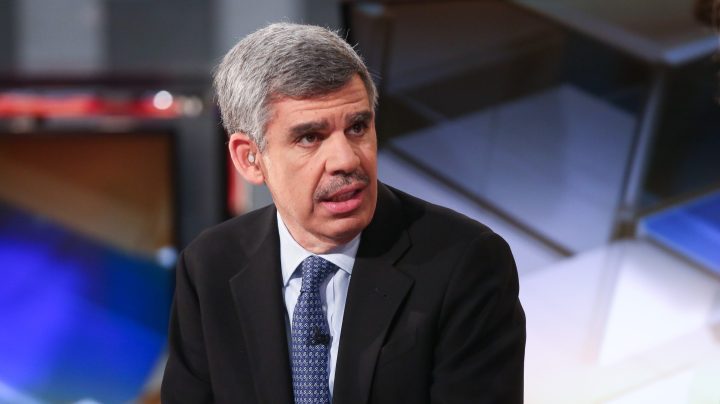
Mohamed El-Erian on Fed’s inflation target: “There’s nothing scientific about 2%”
Mohamed El-Erian on Fed’s inflation target: “There’s nothing scientific about 2%”

Recently, data has come out showing that wage gains have slowed, inflation is trending down, and an overly hot jobs market may be starting to cool.
Mohamed El-Erian is president of Queens’ College, Cambridge, former CEO of the Pimco investment house and current chief economic adviser at Allianz. The last time he spoke to Marketplace, the Federal Reserve had raised interest rates seven times in its campaign against inflation. Now, after four more hikes and lower monthly inflation readings, the hoped-for “soft landing” scenario seems a realistic possibility.
El-Erian joined “Marketplace” host Kai Ryssdal to talk about the Fed’s 2% annual inflation goal. An edited transcript of their conversation is below.
Kai Ryssdal: You’ve said a number of times, I think — and I don’t want to get into the whole soft landing debate — but you have said that we can avoid a recession in this country if the Fed does not overtighten. That is to say, raise interest rates too much further. I guess my question is, how are we going to know when the Fed may possibly be overtightening?
Mohamed El-Erian: That is a great question. And that’s where the balance of risk comes in. So imagine that you are at a stable 3% inflation rate. And the choices you have are the following: One is go to 2% and risk tipping the economy into recession or alternatively live with 3% and avoid a recession. That’s the sorts of things that the Fed is going to be forced to think about towards the tail end of this year. And it’s going to be tested, and it’s not an easy decision. But I think that if the Fed was able and willing to swallow its pride, it would probably opt for the first option, which is better for the economy: Live with a slightly higher inflation rate, but don’t dip the economy into recession.
Ryssdal: It’s no small thing, as you know, for the Federal Reserve, which is, first of all, a hidebound and tradition-bound organization, but it picked 2% for a reason. It has stuck with that for a very long time. Are you saying now that they ought to just come out and say, “You know what? Never mind. Three percent, we’re good”?
El-Erian: So let’s talk about why pick 2%. It picked 2% because the other central banks picked 2%. And it then chose 2% because 2% seemed appropriate. There’s nothing scientific about 2%. This is a judgment. The reality is that the economy has changed, that the supply side has become more problematic and that a 2% inflation rate may be too low. The problem, as you rightly say, is how do you change your inflation target when you have not met it for such a long time? And I think the only way you can do that is by promising us 2% down the road for 2025, 2026, and seeing whether we can live with a stable inflation rate that is slightly higher.
Ryssdal: Let me ask you about something you just said. You used the word “judgment,” and I want to ask about judgment and the use of data. The Fed, as you know — and Powell says it, and [former Chair Ben] Bernanke has said it and [former Chair Janet] Yellen — they’ve all said it, “We’re a data-dependent organization.” You have said you worry about the Fed becoming too data-dependent, excessively data-dependent. And I wonder what you think the Fed is supposed to do. Because surely we don’t want the central bank just sticking a finger up in the wind and saying, “Yeah, this feels good.”
El-Erian: No, absolutely. The big difference between this Fed and the Bernanke Fed and the Yellen Fed is not that they are data-dependent or not data-dependent. They’re all data-dependent, but the other two had a medium-term view of the economy. This Fed is excessively data-dependent, which means that its policy actions are a function of backward-looking data. So step back and think of this: The data is backward-looking, and your tools operate with a lag. So at some point, it is like driving the car looking at your rearview mirror. You cannot be data-dependent without also having a view of how the economy is going to evolve over the medium term. And we don’t have that. And there’s a very good reason for that. It is an embarrassing reason, which is that, as you know, the Fed adopted a new monetary framework in 2021 that was suited for the world of yesterday and is not suited for the world of today or the world of tomorrow.
Ryssdal: As the Fed looks forward out of its windshield and as you sit in the back seat and look, I guess, to really kill that metaphor, what are you seeing in this economy? I mean, most indications are that things are pretty good.
El-Erian: Exactly. And most indications [are] that they shouldn’t have hiked the last time. And there’s a risk right now that they are going to overdo it. This economy is doing just fine and the last thing we should risk right now is tipping into recession. One of the problems of having inflation too high for too long is that you’ve eaten away at the purchasing power of people. And that’s particularly problematic for those on low income. So the last thing you want to do is increase income insecurity. Can you imagine first you hit them with inflation shock, and then you take the income away? That would have significant distributional effects.
Ryssdal: Last thing, and then I’ll let you go. We talked about this on the program at the beginning of the pandemic and as inflation started to go up, and you were deeply worried about the Fed waiting too long. And now it seems you’re worried about the Fed going too far. Overall, how do you think the Fed has done in this inflation crisis?
El-Erian: I think it completely mischaracterized inflation as transitory initially. So that’s on the negative side. Second, when it acknowledged it wasn’t transitory, it didn’t move fast enough. That’s also on the negative side. Then it really moved quickly. And let’s not forget we had four consecutive hikes of 0.75%. We’ve never had that in history. So that’s on the positive side. And now it has a big test. Will it have the courage and the vision to settle on the right inflation rate and the right function of the economy? Or will it just follow what I think is an outmoded inflation target and tip this economy into recession? So, the final grade is still [to be determined].
There’s a lot happening in the world. Through it all, Marketplace is here for you.
You rely on Marketplace to break down the world’s events and tell you how it affects you in a fact-based, approachable way. We rely on your financial support to keep making that possible.
Your donation today powers the independent journalism that you rely on. For just $5/month, you can help sustain Marketplace so we can keep reporting on the things that matter to you.

















